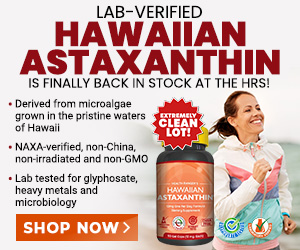
Red Card for Mercury! Time for total ban (press release)
Wednesday, August 23, 2006 by: NewsTarget
Tags: health news, Natural News, nutrition
- Criminal referral requests filed against Fauci and top COVID officials in seven states
- Photonic revolution: New chips process data using light instead of electricity
- Dane Wigington exposes climate engineering as ‘All-Out Weather and Biological Warfare’
- Pfizer's RSV vaccine linked to preterm births as drug giant CONCEALED RISKS from pregnant women in unethical clinical trials
- Sen. Johnson demands COVID vaccine makers hand over all documents, communications, as evidence against their products reaches a climax
- Aluminum, essential to vaccine science, also causes serious health conditions, including chronic fatigue, neurodegenerative diseases, macrophagic myofasciitis
- Israeli lobbyists boast of controlling US national security policy in leaked AIPAC audio
- Aerosolized bioweapons? Strange “diploid biomasses” falling out of the sky in Florida captured under the microscope
- DOGE unveils $400M unemployment fraud scandal: Toddlers, futuristic birthdates fuel outcry
- Analysis: The coming economic collapse, a mass uprising and Trump's three secret weapons to halt the growing revolt
- Tulsi Gabbard leads charge against the Biden regime’s global censorship of the 'Disinformation Dozen'
- Chemtrails unveiled: How the CIA and Big Business are manipulating the weather for profit
- Shedding light on the dark side of MMR vaccines: How vaccinated individuals SPREAD MEASLES & put the vulnerable at risk
- Fauci is back in the limelight, and he’s busy promoting a future COVID or FLU pandemic
- Widespread social and economic unrest: Steve Quayle issues urgent financial warning of imminent asset collapse in new interview with Mike Adams
- Gardening tips: 15 Simple tricks to double your garden’s yield this season
- Oats: A nutritional powerhouse for health and wellness
- U.S. lawmakers investigate Meta over alleged China collaboration
- Aerosolized bioweapons? Strange “diploid biomasses” falling out of the sky in Florida captured under the microscope
- Widespread social and economic unrest: Steve Quayle issues urgent financial warning of imminent asset collapse in new interview with Mike Adams
- Tulsi Gabbard leads charge against the Biden regime’s global censorship of the 'Disinformation Dozen'
- Fauci is back in the limelight, and he’s busy promoting a future COVID or FLU pandemic
- Analysis: The coming economic collapse, a mass uprising and Trump's three secret weapons to halt the growing revolt
- Kiss Your Genetic Privacy Good-Bye! 23andMe Gets Green Light to Sell Your Intimate Genetic Details to Anyone They Want
- CLOT SHOT PLANDEMIC UNFOLDING: Fibrous, rubbery clots caused by covid injections have prion-like seeding activity
- Mike Adams releases country western hit single: Goin’ Back in Time is Comin’ Home
- DEATH by VACCINE or face PRISON time: Canadian Freedom Convoy leaders CONVICTED for protesting forced vaccination during the Covid Plandemic
- Tulsi Gabbard takes aim at censorship: Justice for the ‘Disinformation Dozen’
- How Israeli military-connected corporations are secretly controlling your online privacy
- European Court of Justice: Healthcare professionals who promoted or administered COVID-19 vaccines are CRIMINALLY LIABLE for any harm caused
- Defunding DEADLY mRNA jabs: Government funding for mRNA technology being scrutinized and sidelined until proven "safe and effective" for real
- U.S. lawmakers investigate Meta over alleged China collaboration
- Federal employees whine over DOGE's new directive requiring them to do a 5-point summary of weekly accomplishments
- U.S. approves new Russian ambassador as diplomatic thaw continues
- Trump administration poised to overhaul crypto regulations with new SEC leadership
- I Want My Bailout Money – new song and music video released by Mike Adams
- Newly released JFK files reveal Pentagon's role in creating Lyme disease and covid in the same lab
- Analysis: The coming economic collapse, a mass uprising and Trump's three secret weapons to halt the growing revolt
- Mike Adams releases country western hit single: Goin’ Back in Time is Comin’ Home
- MEDICAL BOMBSHELL: FDA admits Covid mRNA 'Vaccines' CAUSE CANCER
- Aerosolized bioweapons? Strange “diploid biomasses” falling out of the sky in Florida captured under the microscope
- Trump reverses course on Gaza plan, says “nobody is expelling Palestinians”
- Dr. Mike Yeadon releases 15-minute testimony - WATCH - about genocidal intent of COVID “vaccines”
- Kiss Your Genetic Privacy Good-Bye! 23andMe Gets Green Light to Sell Your Intimate Genetic Details to Anyone They Want
- 5 Simple steps to boost your brainpower: How to strengthen executive function in a distracted world
- A lack of integrity in Academia: Harvard professor found GUILTY of fraudulent research to promote CRT theory
- The Health Ranger releases “Vaccine Zombie” song and music video, using AI-animated zombies for the music video
- California's social media censorship law struck down: A victory for free speech or a threat to online safety?
- Rep. Nancy Mace introduces bill to ban biological males from female facilities on federal property
- EPA advisor admits the agency is funneling billions to climate groups ahead of Trump’s return to White House
- Survival 101: Effective EMF blocking techniques
- OpenAI whistleblower who dissented against how the company trained ChatGPT found dead
- Space war brewing? Russia threatens to destroy Starlink satellites
- European Court of Justice: Healthcare professionals who promoted or administered COVID-19 vaccines are CRIMINALLY LIABLE for any harm caused
- Red Cross issues warning to stop blood plasma donations from vaccinated people
- Scientists confirm: GENIUS brain function can be spontaneously unleashed in humans without any apparent cause
- EPA advisor admits the agency is funneling billions to climate groups ahead of Trump’s return to White House
- HYSSOP: What research reveals about the health benefits of this ancient holy herb
- Two containers with completed ballots fall out of truck in Florida
- Newly released JFK files reveal Pentagon's role in creating Lyme disease and covid in the same lab
- Global leaders unite to clamp down on “misinformation” with UN-backed Cascais Declaration
- Fully vaccinated about to see “tsunami” of illness and death, warns virologist
- BREAKING: 2025 NDAA authorizes mandatory military draft of WOMEN across America… as Pentagon pursues global NUCLEAR war with both Russia and China at the same time
- Michael Yon warns of a ZIONIST TAKEOVER in Trump’s second administration
- Ozempic and Wegovy weight loss drugs are injectable LIZARD VENOM PEPTIDES that may unleash a devastating wave of organ failure… side effects align with symptoms of SNAKE BITES
- The Health Ranger releases “Vaccine Zombie” song and music video, using AI-animated zombies for the music video
- BOMBSHELL: DNA testing kits are a SCAM to develop ethnic-specific bioweapons
- Mike Adams releases country western hit single: Goin’ Back in Time is Comin’ Home
- Israeli soldiers accused of even more torture and abuse in the West Bank
- These 13 countries just signed an agreement to engineer a global FAMINE by destroying food supply
- NASA admits that climate change occurs because of changes in Earth’s solar orbit, and NOT because of SUVs and fossil fuels
- RFK Jr. clears key hurdle: Sen. Susan Collins backs controversial HHS nominee, signaling a new era for health policy
“Anti-mercury NGOs insist that the export ban should apply to the widest possible range of mercury-based substances, including compounds and products containing mercury”, said Elena Lymberidi, ‘Zero Mercury Campaign’ Project Coordinator at the European Environmental Bureau. “The EU’s double standard must change”, said Michael Bender, of the Ban Mercury Working Group. “Allowing both the continued export of feedstock for major uses of mercury, and products containing mercury, increases the risk that people and the environment in non-EU countries are exposed to mercury and mercury pollution, while EU citizens are protected.”
It is estimated that converting liquid mercury into a compound, before converting it back to elemental mercury once it has left the EU, costs about US$200 per flask. At the current market price of about $600 or more per flask, unscrupulous traders could take advantage of the “mercury compound loophole”, convert the mercury to a compound for export, have it converted back to elemental mercury outside the EU, and still make a profit. Only recently, the price of mercury was just $200 a flask.
NGOs have demanded the establishment of a tracking system to monitor the import, export and intra-EU transport of metallic mercury and its compounds, plus a review of ways in which the scope of the ban and mercury storage can be extended, ahead of the effective export ban deadline.
In view of the 20 June Council Working Group meeting on the issue, environmental and health NGOs are urging the Council to strengthen the Commission’s proposed restriction on the use and marketing of measuring and control equipment containing mercury. “All consumer and professional uses should be included in the restriction, with special focus on blood pressure measuring devices in hospitals, with exemptions for only a limited period and only where alternatives don’t exist,” said Karolina Ruzickova, of Health Care Without Harm. "Hospitals in many EU countries are already becoming mercury-free. There are serious occupational hazards for healthcare workers who are in contact with leaking or broken devices. Mercury waste management is expensive and creates potential risks for mercury emissions in the environment.” The European Parliament’s March 2006 resolution called for a wider scope including the restriction of health-care equipment containing mercury.
We urge EU Institutions swiftly to adopt the proposals, to help reduce mercury supply and demand in the EU and worldwide, in line with UNEP Governing Council recommendations.
Health news at FETCH.news
Get independent news alerts on natural cures, food lab tests, cannabis medicine, science, robotics, drones, privacy and more.
Take Action: Support Natural News by linking to this article from your website
Permalink to this article:
Embed article link: (copy HTML code below):
Reprinting this article:
Non-commercial use OK, cite NaturalNews.com with clickable link.
Follow Natural News on Facebook, Twitter, Google Plus, and Pinterest
Science News & Studies
Medicine News and Information
Food News & Studies
Health News & Studies
Herbs News & Information
Pollution News & Studies
Cancer News & Studies
Climate News & Studies
Survival News & Information
Gear News & Information
News covering technology, stocks, hackers, and more



"Big Tech and mainstream media are constantly trying to silence the independent voices that dare to bring you the truth about toxic food ingredients, dangerous medications and the failed, fraudulent science of the profit-driven medical establishment.
Email is one of the best ways to make sure you stay informed, without the censorship of the tech giants (Google, Apple, Facebook, Twitter, YouTube, etc.). Stay informed and you'll even likely learn information that may help save your own life."
–The Health Ranger, Mike Adams













































